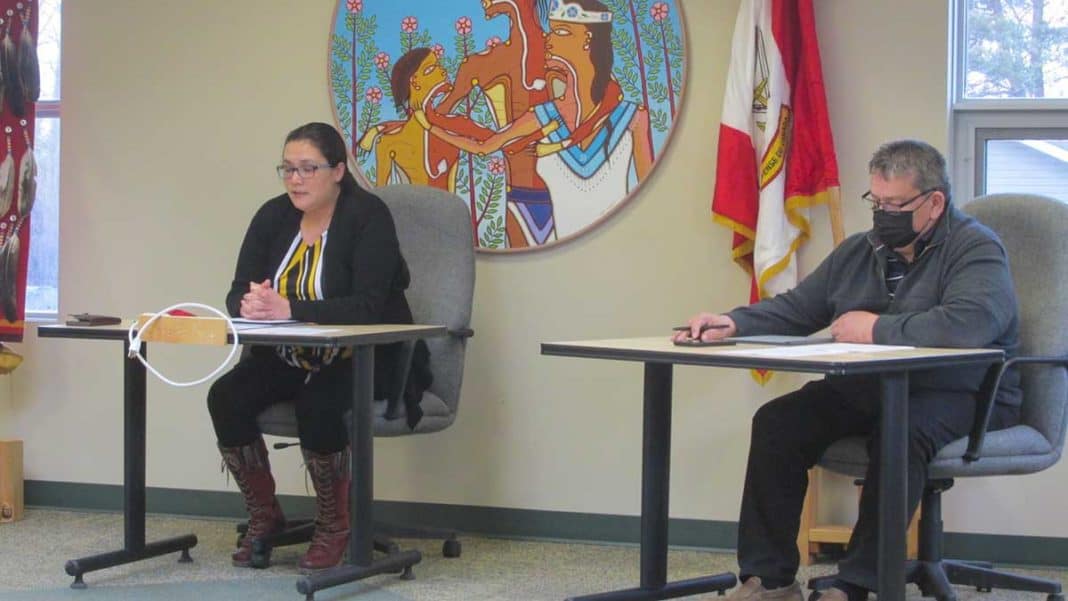M’CHIGEENG – With as many as 80 people suffering from opioid addiction in the community, and about 35 percent of all paramedic calls on Manitoulin related to overdoses from January until present located in M’Chigeeng, chief and council of M’Chigeeng First Nation (MFN) have declared a state of social emergency as it relates to opioids, community safety, mental health and violence. They have also passed an emergency protection bylaw to address drug dealers in the community.
“It’s time,” stated Art Jacko of Enaagdenjged. “We’ve had too many deaths in the community. We are taking action. Enough talk, it’s time for action and for everyone to work together to resolve this issue.”
The announcement was made at a live press conference on March 25 attended by M’Chigeeng Chief Linda Debassige, Health Services manager Roger Beaudin, Mr. Jacko and Inspector Cori Slaughter of the UCCM Anishnaabe Police Service. Inspector Slaughter, also UCCM Police director of operations, represented UCCM Police Chief Faron Whiteye who was attending a police commission meeting on the same topic.
“It’s been a long road for M’Chigeeng with the COVID-19 pandemic and we have also experienced significant losses in our community as it relates to opioids,” said Chief Debassige. “We have also experienced situations that are concerning to our community safety. We recognize the mental health of our membership has been impacted, not only by COVID-19, but also by illicit drugs and drug activity occurring in our community. It has resulted in a lot of incidences of violence.”
Chief and council met in a long session the previous week where they were provided with information and statistics, as well as a list of incidents. “We recognize the pleas from our membership for our community who need further action and who have increased steps that hopefully erases the situation that we find ourselves in. We acknowledge and share the hurt, the pain, the grief that many members of our community are feeling,” Chief Debassige said. “We too are angry, we too are frustrated and we share that with you. The council is committed to doing more. With historically inadequate resources our progress has been good, but it’s also been slow. Over many years leadership and staff of MFN have come together in various initiatives, programs and solutions however we seem to not be able to keep up to the unwellness and to the illicit drug activity that we’re seeing that is now really impacting our youth and killing our people.”
Members of the community have been petitioning councillors for some time, the chief noted, and so council declared the social state of emergency and also passed the emergency M’Chigeeng First Nation Community Protection Order By-Law.
“Over the past year there has been a significant increase of opioid-related deaths and an increase in drug traffickers who are coming into the community and supplying vulnerable members with illicit drugs including fentanyl, carfentanil, cocaine, heroin and crack,” she added. This has resulted in an escalation of overdoses and violence within the community resulting in threats and bodily harm to vulnerable community members.
Chief Debassige noted that along with chief and council all sectors of the administration, including the health service, have been continuously working toward community wellness for many years. The COVID-19 pandemic has certainly placed an increased risk on the community, leaving existing programs and services for mental health and community safety grossly underfunded and inadequate at meeting community needs, she said. “Staff are overwhelmed. Members of our community feel unsafe. The elders are fearful and young people continue to be targeted.”
M’Chigeeng is calling on the federal and provincial governments for support. Chief Debassige noted that they have provided the federal government with a list of immediate needs and a plan of action but that funding is not sustainable at this point. “While we are grateful for this support, continued and sustainable funding to meet the needs of our community for many years to come is required. Recovering from addiction is a journey and we must continue to work with the complex and diverse needs of our struggling members. We require the resources to have appropriate personnel in place to support our wellness efforts.”
“We are really thankful for our leadership to declare a state of emergency at this time,” said Mr. Beaudin. “It’s a plea for help. We’re seeing such a high rate of addiction that we need help. We need other resources to assist us to do this to deal with the situation we’re in, whether it’s a police team, addiction services or a treatment centre. We’ve seen a substantial increase in overdoses in the last year. The number of overdoses that paramedics have responded to on Manitoulin has substantially increasing for M’Chigeeng and I believe for this year alone, close to 35 percent of the calls are just for M’Chigeeng. That’s a scary number that we’re looking at.”
“So where do we go from here?” he asked. “When we look at solutions, it has to be a community effort. We have to look at all of our partners and utilize all resources that come out of the declaration of a state of emergency. This is not going to happen overnight. This is going to be a long-term investment. The addictions didn’t start yesterday.”
“There may be times that you may not see the work being done but there is a tremendous amount of work being done by our staff, many of whom are dedicated to the wellness of our people,” Chief Debassige said. “We are Anishinaabe people. We are good people and we have a good community. Every single person living here is a beautiful soul. Some may be hurting right now, so we do ask that you be kind to one another; that we help support one another. We ask you to be part of the solution for the betterment of our community, our youth, our elders, our families all depend on it.”
M’Chigeeng’s chief and council have been working with the UCCM Police; however, the police services face the same funding constraints and lack of support at both provincial and federal levels it was noted. UCCM Police has limited personnel and no dedicated drug enforcement unit, and due to its large catchment area has limit time to spend in the communities it serves. “Both federal and provincial governments have delinked to enforce and prosecute our bylaws,” Chief Debassige said. “This leaves our communities at a continued vulnerable place.”
The opioid crisis is affecting many communities and has reached a point of escalation not previously seen, said Inspector Slaughter. “We are committed to working with all the agencies to be able to further this initiative. Addiction is something that is taking a toll on our entire community. We pledge to work closely with all of our agencies to address this further so we ask that anyone seeing suspicious behaviour that they contact either UCCM Police or Crimestoppers if they’re uncomfortable making calls for family members who are struggling with addiction.”
Chief Debassige noted that there is a disconnect between the OPP service, which has more resources at its fingertips, and UCCM Police. UCCM Police are not recognized as being an essential 24/7 service she explained, leaving time gaps where illegal drug dealers, often from Toronto, are able to enter the community with guns and prey on the community’s citizens. The purpose of the emergency community protection bylaw is to protect the community from illegal drug activity and to remove drug dealers from MFN lands, including MFN members and non-members.
Council has also provided supports for additional measures including security, security cameras and the creation of a mental health and addictions, community wellness, protection and cultural department to better support the community of a whole. An Opioid Emergency Operations Group has also been implanted and MFN will continue to advocate for resources for both the community and policing services it was noted. MFN alongside UCCMM Tribal Council continue to advocate for funding to construct Gwekwaadziwin Youth Treatment Facility for youth aged 13 to 17 years, added Chief Debassige.
Editor’s Note: See more coverage in upcoming edition of the Recorder.





